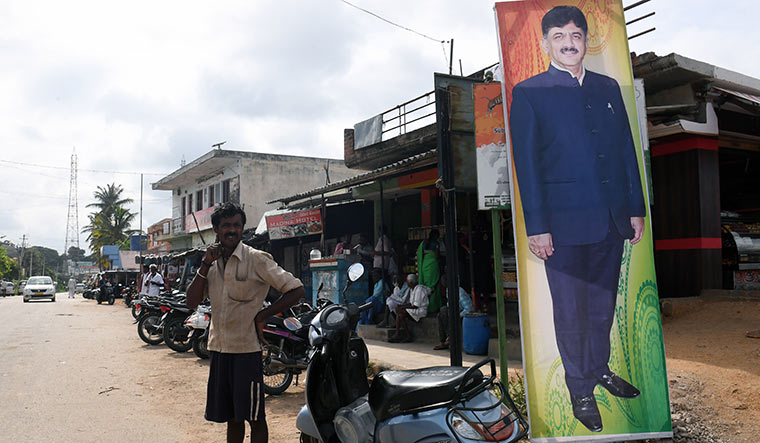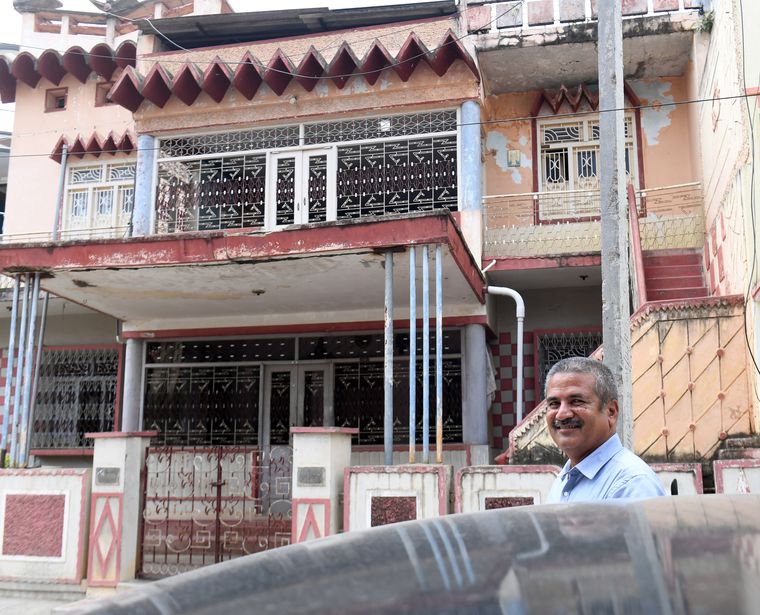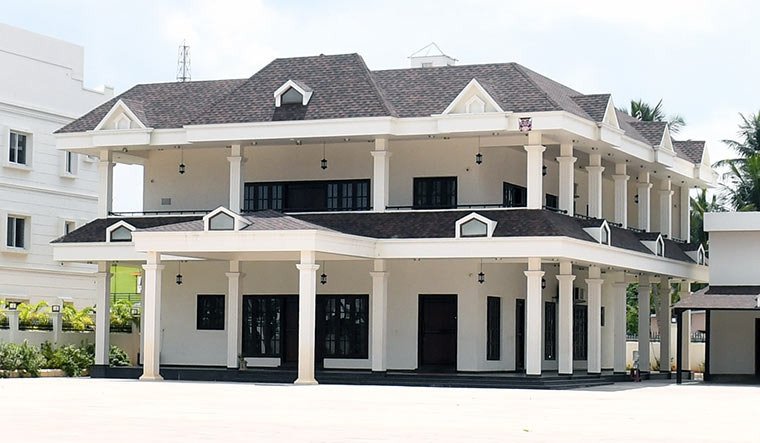An 18-year-old was riding a motorcycle in Kanakapura, Karnataka, when a government bus behind him started honking hysterically, trying to overtake the bike. The young man refused to move aside and instead raced ahead on the narrow road. His friend, riding pillion, clung on to his seat with his heart in his mouth.
Almost 40 years later, D.K. Shivakumar seems to be living up to his reputation of being audacious. The troubleshooter of the Congress and seven-time MLA has earned the nickname ‘Kanakapura Bande’ (rock of Kanakapura) for his guts. On September 17, a special court in Delhi sent Shivakumar to judicial custody till October 1 in a money laundering case. The Vokkaliga strongman and former minister had been summoned by the Enforcement Directorate in Delhi for questioning on August 30, and was taken into custody four days later. The court also directed the ED to take him to the Dr Ram Manohar Lohia Hospital first (he had chest pain and had been admitted there for some time during custody). If the doctors said he was well enough to be discharged, said the court, he would be taken to Tihar Jail. At the time of going to print, Shivakumar was in hospital.
When he was arrested, there were massive protests in Bengaluru and in his constituency of Kanakapura. And in the past two weeks, at least a thousand supporters have flown to Delhi to see him. The Congress veteran has said that he has been wrongly accused; those close to him allege a political conspiracy.
While there is high drama in Delhi, an eerie silence envelops Shivakumar’s native village of Doddalahalli, and the hamlet of Kodihalli, where his extended family lives. The villages are in Kanakapura taluk of Ramanagara district.
A huge cut-out of Shivakumar welcomes you at the village junction in Doddalahalli, where policemen stand guard. The villagers are foxed by his arrest and some of his supporters have sworn off news channels, alleging they show Shivakumar in a bad light. “Media reports about him having 300 bank accounts are not true,” says S. Mahesh, whose father Somaraju was a close friend of Shivakumar. “I know how difficult it is to open a bank account. Did the ED count the bank accounts of all his namesakes?”
There is also a renewed debate on the family’s affluence. One of the villagers estimates that the family owns 60 acres in Doddalahalli alone.
Shivakumar has declared assets worth Rs840 crore. His wife, Usha, and elder daughter Aishwarya have Rs86 crore and Rs108 crore, respectively. The ED had also summoned Aishwarya on September 12, and is investigating her business dealings. The assets of Shivakumar’s brother, Congress MP D.K. Suresh, reportedly increased from Rs86 crore in 2014 to Rs339 crore in 2019.
Shivakumar and Suresh make frequent trips to the village either to review development works, attend weddings and festivals or to pay respects to their ancestors. Shivakumar’s paternal grandfather, Chikka Kempegowda, used to trade in farm produce and also owned land. “I remember as many as 100 labourers working on their farm,” says Mahesh. “They used to carry lunch for all the labourers in a Jeep every afternoon. [His father Kempegowda] was a hardworking man and used to rear sheep, cows and buffaloes. [Their mother] Gowramma wakes up at 4am every day to release water to the plantation crops and rears chicks. His family was also into subcontracting.”
Says Bhole Gowda, a cousin of Shivakumar, “His father got his share of 10 acres in the ancestral property, where they grew paddy and ragi. After his father’s demise (in 2013), his mother moved to the Kodihalli farmhouse. The brothers then demolished the ancestral house in Doddalahalli and built a bungalow. They have leased out their farmland. After he entered politics, he has bought some land, but that is mostly in Kodihalli and Kanakapura.”
Many in the village say the current crisis could have been avoided had Shivakumar not earned so much money. “He has become rich by extracting rocks (quarrying) in the forest region,” says an old man who did not want to be named. “While his supporters have grown rich, the farmers who used to grow paddy are forced to grow ragi and peanuts owing to scarce rains.”
But even his critics do not dispute that he is the tallest leader to emerge from the village. They say Shivakumar strengthened the Congress in the region, which was a Janata Party bastion till 1989. They also credit the brothers for helping each villager get the benefits of government schemes, and for eliminating middlemen and bribes.
The brothers, who divide their time between Bengaluru and the constituency, stay at a bungalow in Kanakapura city to hold their meetings. Their mother lives in a farmhouse with attendants at Kodihalli, where there is a government college named after her (the family donated the land for the college).
“Kanakapura was listed among the most backward places [in the state],” says Marasappa Ravi, Shivakumar’s childhood friend. “He decided to focus on education to remove that tag. Today, there are quality schools. In his engineering college in Bengaluru, any student from Kanakapura has to pay only tuition fee.”
Education was important to Gowramma; she wanted her first-born, Shivakumar, to become an engineer or officer. So, she sent him to her elder sister’s place in Bengaluru for his studies. There, under the watchful eyes of his uncle, an Army man, Shivakumar led a disciplined life. He would wake up early to tend to the cows and deliver milk on his cycle before rushing to school.
Even at a young age, Shivakumar was interested in business. At 18, when his father decided to sell some ancestral land, the son had a condition. He wanted the proceeds of the sale to be invested in buying two and a half acres in the city. Shivakumar set up a poultry farm in Bengaluru and also opened two tent cinema halls, one each in Doddalahalli and Kodihalli. But his entry into the granite business a few years later drew flak from environmentalists and dented his image. He was accused of land-grabbing and violating the Karnataka Forest Act.
“As a student, he always wore a silk shirt, a thick gold chain and gold rings. He had a bike in Bengaluru and one at his village,” says Ravi, who rode pillion and survived those early bike rides. “His style was unmatched.”
Shivakumar started off as a student leader in a college run by the Hyderabad Karnataka Education Society in Bengaluru. But when he decided to contest the college elections, he realised that the other candidates had the backing of powerful politicians and officers. So, he approached S. Bangarappa, a powerful Congress leader. He won the election. In 1989, he contested against H.D. Deve Gowda in Sathanur (now Kanakapura) and lost. He won the byelection held after Deve Gowda vacated the seat and has held it since.
The DK brothers are so popular in their constituencies that they canvass for only a day or two before elections.
“The farmers here are happy. Today we have latest technology in both milk and silk, which the district is known for,” says Shivakumar, a cousin who handles constituency work. “They (the brothers) encouraged milk cooperatives and set up a milk powder unit, too. He went to China to study silk farming techniques to help tide over labour shortage.”
Shivakumar is quite a common name in the village. “Children here are named after the local deity Shivaaladappa,” says Mahesh. “The name Kempegowda is also popular as he was the nadaprabhu (ruler). Now, out of reverence to D.K. Shivakumar, many have dropped their initials.”
Many of Shivakumar’s supporters say that his loyalty to his party might have made him a target. “The trouble started two years back, when Gujarat MLAs were brought to Bengaluru (amid poaching fears) and were huddled in Eagleton resort under the watchful eyes of sahebru (boss),” says Shivakumar, the cousin. “Ahead of the Rajya Sabha elections, in which Congress general secretary Ahmed Patel was seeking re-election, [BJP president] Amit Shah called up sahebru asking him to release just two legislators. But he refused. He would not betray the party, which is like his mother. Moreover, he believes his time to become the chief minister is much closer than anybody can imagine. The arrest has only earned him more sympathy. He will bounce back.”





